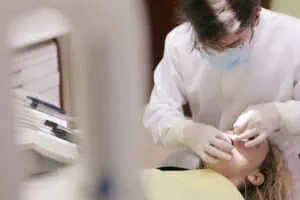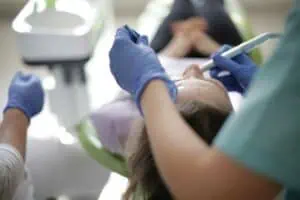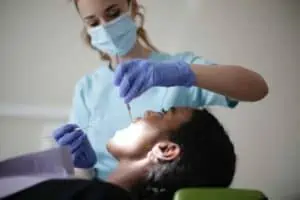General Dentistry

What’s a Bad Bite?
The way your upper teeth and lower teeth come together when you bite down is an important part of your oral and overall health. After all, proper bite function helps with your ability to chew, swallow, and even breathe. A healthy bite also makes it easier to care for teeth and lowers the risk of enamel erosion and jaw pain. If your upper teeth fall slightly over your lower teeth and the points and grooves in your back molars fit together like a puzzle, chances are you have a good, healthy bite. If they don’t, it’s more likely that you have a bad bite. Bad bites can cause jaw pain, enamel erosion, bad breath, dry mouth, and many other dental problems that will require visits to your dentist in Sparks.
Types of Pain Caused by a Bad Bite
While many bad bites have obvious signs, such as “buck teeth” or a lower jaw that protrudes, others aren’t as obvious until there’s pain involved. Some types of pain that may be a sign of a bite include:
- TMJ Pain – Your TMJ, or temporomandibular joint, helps you open and close your mouth. When your teeth don’t line up, it can cause stress on this joint and result in jaw pain, stiffness, or clicking when opening and closing your mouth.
- Headaches – While headaches are a sign of TMJ trouble, they can also indicate a problem with your bite. When your bite is misaligned, the muscles in your jaw, which connect to your head, can become strained and cause headaches.
- Tooth Pain – Even though tooth pain can be caused by any number of things, if you have a bad bite, you’re at more risk for enamel erosion and excessive wear and teeth, all of which can cause tooth pain.
What Causes a Bad Bite
Bad bites are usually considered a problem reserved for kids or teens, but adults can develop bad bites too. Most bad bites are the result of genetics, but others can be contributed to things such as:
- Thumbsucking
- Pacifier use
- Dental injuries
- Nail biting
- Tooth grinding
- Bone or tooth misalignment
- Pushing the tongue against the teeth
4 Different Types of Bad Bites
Bad bites can present themselves in a variety of ways, but many can be classified into four main types of bad bites. The four different types of bad bites are:
- Underbite – when the lower teeth fall over your top teeth
- Overbite – when the top teeth hang out too far over the bottom teeth
- Crossbite – when a top tooth, or even several top teeth, fall inside of lower teeth
- Open Bite – when the front teeth the molars on top don’t touch those on the bottom
The best way to know for sure if a bad bite is to blame for any pain you have is to see your dentist in Sparks. They’ll talk to you about whether or not a bad bite is causing your pain as well as the best way to alleviate your discomfort.

The Body’s Response to Stress
When we feel stressed, our bodies will react in ways we may not even realize. For example, our immune system’s response will become delayed, and our adrenal glands will release the stress hormones of adrenaline and cortisol. The surge in these hormones will cause our nervous system to enter “fight or flight” mode, which is beneficial in times of short-term stress. But when it comes to prolonged stress, it can affect our memories, and learning systems, and increase the risk of depression. Additionally, heightened periods of stress can seriously affect oral health.
- Tooth Decay & Stress
During periods of prolonged stress, we are more susceptible to tooth decay. Why? Stress can cause our bodies to remove the naturally occurring protective minerals and allow dangerous bacteria and acid to linger around in the mouth. This can increase the likelihood of developing a cavity. Additionally, when we are stressed, we tend to resort to things that make us feel better, including alcohol, nicotine, or foods loaded with sugars. But these clutches can inevitably cause more harm than good.
- Gum Disease
Study upon study has shown a correlation between the development of gum disease and experiencing stress. There are several theories behind why this happens. One of which is when we are feeling stressed, we tend to bypass everyday things like brushing and flossing our teeth. Additionally, since increased stress levels can make our immune systems less effective, it means that our bodies can’t effectively fight off bad bacteria in the mouth. This increases the risk of developing gum disease. If not treated by a dentist in Sparks quickly, gum disease can lead to tooth loss, bad breath, and a whole host of other health problems, such as heart disease.
- Jaw Pain
Everyone experiences and reacts to stress differently. Some of the most common side effects of increased stress include clenching or grinding your teeth. These reactions are often done without us even realizing we’re doing it, but they can lead to some problems. For example, when we clench or grind our teeth, whether it’s done while we’re awake or asleep, the jaw can experience unnatural pressure and cause pain. Other signs that you’re clenching or grinding may include:
- Earaches
- Headaches
- Jaw clicking
- Weakened tooth enamel
- Increased tooth sensitivity
Reduce Stress, Protect Teeth
Combating stress is tough because there is no one-size-fits-all solution. However, here are some tips you can try to reduce stress and protect your teeth.
- Eat a Healthy Diet. Eating a well-balanced diet with fruits, veggies, and whole grains will allow your body to function properly and can help keep stress levels low.
- Exercise Often. Exercising, even if it’s a quick walk around the block, will activate the “feel good” chemicals in our bodies that make us feel happier and less stressed.
- Get Enough Sleep. Adults should get anywhere between 7-9 hours of sleep every night. This will help your body relax and reset, lowering stress.
Oral health is the window to overall health, and taking good care of it can help protect your body from some scary, and serious problems. One of the best things you can do to ensure a healthy mouth is to see your dentist in Sparks every six months for regular checkups. Schedule an appointment with us today.

Why is This Day Needed?
Around 90% of the world’s population will develop some sort of dental disease at least once in their lifetime. Additionally, many of the oral health diseases that will affect most of the world’s population are preventable. This is one reason why a day dedicated to talking about oral health is important. By joining together and spreading knowledge and education on the importance of dental health, we can not only do more to protect oral health but overall health, too.
Healthy Mouth. Healthy Body.
Focusing on dental health is just as important as focusing on overall health. In fact, studies show that several diseases can be linked back to oral health problems. For example, research on patients with gum disease shows a probable link between it and heart disease, respiratory disease, some cancers, and diabetic issues.
Signs That There is an Oral Health Problem
Knowing the early warning signs of an oral health problem can make all the difference between a quick, easy fix and risking your overall health. Some of the top warning signs that there is an oral health problem include:
- Chronic bad breath
- Bleeding gums while brushing or flossing
- Loose teeth
- Pain in the jaw or mouth
- Mouth sores or lumps
If you recognize any of these signs, we encourage you to see your dentist in Sparks as soon as possible.
Best Ways to Take Care of Your Teeth
Taking care of your teeth and overall oral health is the best way to prevent problems such as gum disease, cavities, and oral cancer. Make sure you:
- Brush your teeth twice a day
- Floss daily
- Avoid tobacco
- See your dentist in Sparks twice a year
There’s never been a better time to commit to caring for your smile, and your body, than World Oral Health Day. Head over to WorldOralHealthDay.org to find resources about how you can take action for yourself and your community.

The Link Between Gum Disease and GI Cancer
The survey from the American Academy for Cancer Research followed over 40,000 men and women for more than a decade, monitoring their health, diets, and results of their colonoscopies. Researchers focused on two types of intestinal lesions that are often precursors to developing colon cancer – serrated polyps and conventional adenomas – as well as patients’ oral health. While it may seem odd to study gut health in relation to oral health, the results were interesting.
- Patients studied were 17% more likely to have a serrated polyp if there was also a history of gum disease.
- Researchers saw an 11% increased risk of having a conventional adenoma if a history of gum disease was also present.
- Participants who lost more than four teeth, a common side effect of gum disease, had a 20% increased risk of having a serrated polyp.
While these survey results certainly seem to point to a correlation between gum disease and colon cancer, researchers say that more studies are needed.
How Can You Tell If You Have Gum Disease?
Gum disease can be treated and cured if it’s detected in its early stages. This is why it’s so important to see your dentist in Sparks twice a year for regular checkups. Early detection is key to treating gum disease effectively before it has a chance to cause bigger oral health or overall health problems. Some tell-tale signs of gum disease may include:
- Bad breath or bad taste that doesn’t go away
- Red or swollen gums
- Tender or bleeding gums
- Painful chewing
- Loose teeth
- Sensitive teeth
- Gum recession
If you experience any of these symptoms, schedule an appointment with your dentist in Sparks as soon as possible to get treatment.
Preventing Gum Disease
There are several ways to protect yourself from developing gum disease, including:
- Brushing your teeth twice a day
- Flossing daily
- Quitting smoking
- Seeing your dentist in Sparks at least every six months
However, it’s important to know that genetics, age, and certain medications can also impact the risk of developing gum disease. Make sure to mention all health conditions and medications to your dentist at every appointment.

What to Look For When Picking a Dentist
Searching for a nearby dentist can be overwhelming, so let’s take a look at some of the ways you can narrow down your list in order to find the best dentist for you and your family:
- Ask Friends – Sometimes finding the best dentist is as easy as talking to friends, co-workers, or family members. So ask around to start your search.
- Read Reviews – Read online reviews of any dental offices you find either from your friends or from an online search to see what your neighbors are saying.
- Check Out The Environment – Look at office photos. Does the office look clean and inviting?
- Get a Feel for The Personality – Once you narrow down your choices, schedule an appointment with your top choice and pay attention to how the team interacts with you. Finding an office and a team that you feel comfortable with is important.
Choosing a Dentist in Sparks For Advanced Dental Care
If you’re someone who is looking for a dental home as well as a dentist that can provide advanced dental care such as cosmetic dentistry like tooth whitening and smile makeovers or restorative dental implants, you may want to dig a little deeper into other aspects of dental offices such as:
- Technology
- Types of Sedation dentistry Available
- Before and After Photos
- Patient Testimonials
- Education and Accreditations
No matter what type of dental office you’re looking for, one fact remains the same – everyone should visit a dentist at least twice a year to protect oral health. These preventive checkups allow your dental team to check for early signs of any problems such as decay. After all, early intervention is key to quicker, easier treatment.
When it comes to the oral health of you and your family, there’s perhaps no better way to protect it than finding the right dentist. At our Sparks dental office, we’re here to take care of our community’s smiles. Give us a call to schedule an appointment!

“Brush, Floss, Smile!”
This year’s slogan is Brush, Floss, Smile! helps both kids and caregivers learn just how important it is for kids to brush their teeth regularly as well as floss in between each and every tooth. To help, ADA has put together fun, interactive games and activities to make learning about dental care fun for kids. Head on over the ADA website and download all sorts of free educational tools including coloring sheets, crossword puzzles, and a calendar to keep track of brushing habits.
How Should Kids Brush & Floss?
Brushing and flossing tiny teeth are important, but your dentist in Sparks will also encourage you to make sure your little ones are doing them correctly. Developing proper technique and a solid routine will help children throughout their lives..
Proper Brushing
Kids and adults should brush their teeth twice a day, once when you wake up in the morning and once before bed at night. Use the following techniques:
- Angle the toothbrush against the gum line at a 45-degrees
- Gently scrub teeth using small circles with the brush
- Brush all surfaces of each tooth and up under the gums
- Brush the tongue from back to front
A thorough brushing should take about two minutes. Don’t shy away from humming songs or finding two-minute brushing videos to turn a habit into a fun activity.
Proper Flossing
It’s just as important for kids to floss once a day as it is for adults, and little ones should start flossing whenever they have two teeth that touch each other. But like brushing, flossing requires a specific technique, and it can be hard for kids. The best way to floss is to gently wiggle the floss in between each tooth and curve it up under the gums. You can try traditional floss but you may have more success with a floss pick.
While brushing and flossing are crucial for all smiles, maintaining visits to your dentist in Sparks is also necessary. Schedule an appointment today!

- Sensitivity
We may all experience some level of tooth sensitivity at some point, but sensitivity due to a cavity may be a new sensation or result in more severe pain than what you’re used to. Typically, tooth sensitivity related to a cavity will occur when you’re eating or drinking something hot, cold, or sweet. This sensitivity is directly caused by the weakening of tooth enamel from decay, making tooth roots and nerves more susceptible to feeling pain.
- Holes or Pits
Teeth are strong, but when decay takes hold, it can easily eat away the tooth structure. As a result, you may notice a deeper pit or obvious hole that wasn’t there before. If you do feel a hole or pit that’s new, don’t hesitate to contact your dentist in Sparks. You may have a cavity that requires immediate intervention to keep it from progressing. Now, there may be times when you don’t feel anything happening in your mouth. That doesn’t necessarily mean that there isn’t decay lurking. Dentists have the tools and technology to see early signs of decay before you even know something is wrong. That’s why it’s important to see your dentist at least twice a year.
- Discoloration
Tooth discoloration can happen for many reasons – from coffee to smoking and even eating certain foods. However, the discoloration can also be a sign of active decay. Any changes in the color of your teeth should alert you that it’s time to see a dentist, even if it’s white. The truth is, decay can start as a white spot and progress into a brown or darkened appearance over time.
- Toothache
While a toothache can be a sign of many different things, it may have some tell-tale signs if it’s related to a cavity. For example, if you feel pain in your tooth when you bite down, it may be a sign of a cavity. However, if you have a toothache, it’s always wise to see your dentist. Pain is usually a sign of something. Whether or not it’s a cavity or something more, you should see a dentist as soon as possible.
It’s important to know that sometimes cavities will have no symptoms. This is especially common when they’re small. So make sure you see your dentist in Sparks at least twice a year for preventive checkups. During these visits, your dentist will be able to see areas of decay before they become a problem and when they’re easy to treat.
During your dental check ups, it’s common to see both your hygienist and dentist in Sparks. Ideally, these check ups happen twice a year so your dental team can keep a close eye on your oral health and catch any problems early before they have a chance to become a bigger, more serious problem, and while they’re still usually treated easily. But what exactly do your dentist and dental hygienist do during check ups?
Health Updates
Before any type of dentistry begins, your dental team will get an update on your overall and oral health. They’ll want to gather information such as if there has been any changes to medications or newly diagnosed conditions. It’s important to be honest during this conversation as many whole-health problems are also linked to oral health, so the more your dentist knows, the better care they can provide. You should also mention any concerns you may have about your oral health such as any pain, sensitivity, or cosmetic services you may be interested in.
First Steps During an Appointment
While the order of how things happen during your appointment may vary depending on the office, the following is a typical outline of what happens during the first stage of a dental check up.
- Initial Exam
Your dental hygienist may begin your appointment by taking a peek inside your mouth and looking at your teeth and gums. They’re looking for any signs of gum swelling or redness as well as any visual areas of decay. Additionally, some hygienists will also measure gum pockets to monitor for gum disease.
- Cleaning
Next, your hygienist will get to work thoroughly, yet gently, cleaning your teeth. This is a more in depth process than brushing and flossing at home. Special tools are used to remove plaque and tartar buildup from your gums and teeth, which can’t be done at home. They may also gently poke at teeth to check for cavities.
- Polishing
Following your cleaning, your hygienist will polish off your pearly whites using a special tool and paste. Polishing can help remove leftover plaque from your teeth and can even remove surface tooth stains.
- X-Rays
Dental x-rays don’t usually happen at every check up, but they will be taken if it’s been a year or more since your last radiographs or if your dental team needs to see below the surface of your teeth to more closely check out any areas of concern. Dental x-rays are safe and emit very low levels of radiation.
Meeting with Your Dentist in Sparks
After your hygienist conducts an initial exam, cleans your teeth, and takes any necessary x-rays, your dentist will come in to check things out. If there are any areas of concern, they’ll take a closer look at the area and any accompanying x-rays or images. Your dentist will also evaluate your jaw, bite, and teeth for any signs of decay.
Dental health can change quickly, so it’s important to get a check up every six months. If you’re overdue, schedule an appointment with your dentist in Sparks today.
If you’re embarrassed by your teeth, you’re not alone. More than 50% of Americans are insecure about their teeth. This may mean that you cover your mouth when you laugh or smile without your teeth showing in photographs. A lot of the time, smile insecurity is due to the color of teeth. While many things can cause tooth staining, your dentist in Sparks wants you to know that there are several ways you can stop tooth staining in its tracks.
Stop Smoking
One of the main things that cause tooth discoloration is smoking and using other forms of tobacco. Tobacco, along with other ingredients in cigarettes and even smokeless tobacco, is known to cause the yellowing of teeth. Additionally, since tobacco products also contain addictive ingredients, it’s not uncommon for these products to be used several times throughout the day. This means that teeth are constantly exposed to the staining ingredients. Additionally, tobacco stains are harder to remove. While your dentist in Sparks supports quitting smoking and using other tobacco products, we understand that they are difficult to quit. Keep in mind that tobacco use is a leading cause of oral health problems, including oral cancer.
Eat Healthy
Certain foods and drinks such as red wine, tea, coffee, soda, and even pasta sauce can cause tooth staining. But there are also some foods that can actually help reduce staining. Snacking on raw vegetables and fruits such as apples, celery, or even some types of cheese can gently scrub away surface stains.
Brush Your Teeth Often
Your dentist in Sparks will always recommend that all patients brush their teeth twice a day, every day, for two minutes. However, brushing your teeth after meals, particularly the ones that can contribute to tooth staining, is also important. If you can’t thoroughly brush your teeth, try rinsing your mouth out with water to help remove staining ingredients.
If you find yourself in a position where you can’t rinse your mouth out with water, find some sugarless gum and chew it for a little while to remove even more food particles.
Straws Can Help
While it may seem silly, a simple straw is a great way to reduce the risk of tooth discoloration when drinking a tooth-staining beverage. Straws help the liquid bypass teeth and decrease the likelihood of staining. There are several reusable straws you can buy and carry with you in case you run into a situation where straws aren’t available.
To be frank, tooth discoloration happens, sometimes even if you try your hardest to prevent it. But the good news is that there are several cosmetic dentistry options available for whitening teeth and even reversing discoloration. From smile whitening treatments to cosmetic dentistry solutions, like dental veneers, your dentist in Sparks will help you find the best way to whiten your teeth.
Everyday things such as coffee, wine, and even spaghetti sauce can take a once bright, white smile and transform it into something discolored. If you were once used to brilliant white teeth and find yourself staring into the mirror and wondering when your teeth went from dazzling to dull, you’re not alone. In fact, more than half of Americans are insecure about their teeth. The good news is that there are many different ways to whiten your smile. The most common way is over-the-counter whitening strips. However, your dentist in Sparks wants you to know the benefits and risks that go along with the use of whitening strips.
Whitening Strips: 101
Whitening strips are thin pieces of plastic covered with an active whitening ingredient. Some of the active ingredients can include hydrogen peroxide, sodium hydroxide, or chlorine dioxide. When in doubt, look for a product that offers no more than 14% of hydrogen peroxide and steer clear of anything that has chlorine dioxide – it can irreversibly damage tooth enamel. Additionally, it’s crucial to follow package instructions accurately. Whitening strips that are used too often or left on too long can cause unwanted side effects, and there’s no benefit to doing so.
What To Know Before Buying Whitening Strips
There are so many different kinds of whitening strips available to you. You can buy them almost anywhere – from your local grocery store to online without ever consulting your dentist in Sparks. However, we encourage you to first talk with your dentist before spending any money on whitening strips. After all, whitening strips are only effective at removing surface stains and not internal stains, and it’s hard to know the difference between the two without a professional opinion.
Risks of Whitening Strips
While whitening strips can be effective at removing surface stains, they don’t come without their risks. Some risks of using whitening strips can include:
- Gum Irritation – Whitening strips that contain hydrogen peroxide can whiten teeth, but if too much of the whitening strips touch too much of the gums for too long it can cause damage. Whitening strips can result in gum swelling and bleeding if used incorrectly.
- Splotchy Whitening – While whitening strips often use ingredients to effectively stick them to teeth, patchy or splotchy whitening can occur. This can make discoloration even more obvious than it was before.
- Sensitivity – Perhaps the most common side effect of whitening strips is tooth sensitivity. Sensitivity can have symptoms such as fast zaps of pain through teeth and pain when eating or drinking something hot or cold.
Are Whitening Strips Right For You?
The absolute best way to make sure you’re investing your money into something that will give you the results you want is to first talk with your dentist in Sparks. They can help determine the origin of your tooth staining and recommend the best way to whiten your smile that will give you the results you want.



